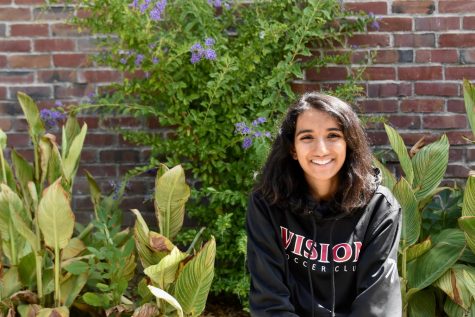Worst of 2018
December 18, 2018
Election Meddling

Although the presidential election occurred in 2016, 2018 has been a year when controversy regarding election meddling, specifically on social media platfo
rms like Facebook, has become an increasingly apparent issue.
According to the New York Times, the Russians were able to reach almost 130 million people by the end of 2017 through Facebook alone and attempted to damage Hillary Clinton’s campaign to help President Donald Trump’s. The U.S. government has led investigations to discover the extent of Russia’s involvement in U.S. affairs, most notably a special counsel investigation led by FBI director Rob Muller. In February 2018, six American intelligence organizations agreed that Russians had interfered with the 2016 election, and as of June 2018, 11 Trump officials admitted to working with the Russians.
Still, many people do not believe that the Russian government played any role in the democratic decisions of the United States. Others, however, like junior Arvind Jagdish, do not agree.
“Pesonally I think that there’s way too much evidence of Russian interference [to deny that it ever happened],” Jagdish said. “If you think about the Mueller probe and the fact that so many people have been caught trying to hide something, if there really [wasn’t] anything, then why would they go to so much trouble to hide it?”
According to Jagdish, the idea that another country can influence America and its democratic process is frightening since it highlights flaws in the electoral process.
“It makes me realize that it doesn’t really matter what we want sometimes,” Jagdish said. “It’s scary thinking that what’s in the best interest of America isn’t actually what’s happening.”
Mass Shootings
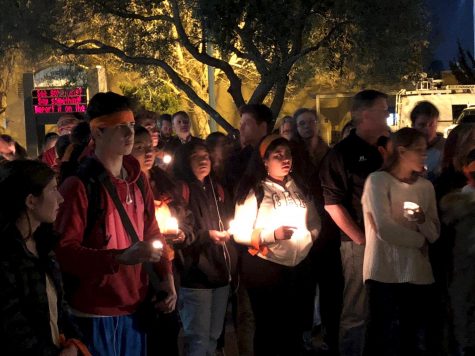 As of Dec. 1, 2018, the United States has seen 325 mass shootings this year, as defined by a shooting in which four or more people are injured or killed. Ranging from a school shooting at Marjory Stoneman Douglas High School in Parkland, Fla. (Feb. 14) to a local shooting in Thousands Oaks (Nov. 7), these tragedies have claimed countless lives and devastated families. Because of the frequency of mass shootings, most are not even publicized on national news.
As of Dec. 1, 2018, the United States has seen 325 mass shootings this year, as defined by a shooting in which four or more people are injured or killed. Ranging from a school shooting at Marjory Stoneman Douglas High School in Parkland, Fla. (Feb. 14) to a local shooting in Thousands Oaks (Nov. 7), these tragedies have claimed countless lives and devastated families. Because of the frequency of mass shootings, most are not even publicized on national news.
The large number of mass shootings in the past three years has fueled a heated debate between those who support gun-control laws and those who align themselves as Second Amendment supporters. President Donald Trump, a firm resistor against strong gun-control laws, believes the answer to controlling these weapons lies in solutions like arming teachers.
Gun-control enthusiasts, on the other hand, typically believe the issue will not be resolved until guns are regulated tightly. For sophomore Victor Li, the continuous and large magnitude of shootings is discouraging.
“I don’t think the government is doing enough to address them,”Li said. “I’m not saying that we should completely ban guns, but I … just think the government should pay more attention to the things that are happening and take more actions to prevent these shootings from happening.”
Especially since Cupertino is a high-risk area for shootings, fitting the typical environment for shootings as a high-pressure, affluent, suburban area, Li feels significantly less safe.
“Obviously, [shootings lead to] kids [losing their lives],” Li said. “But it also puts other kids into stress that they may be shot anytime, and it interferes with their education and emotional well-being.”
Brett Kavanaugh
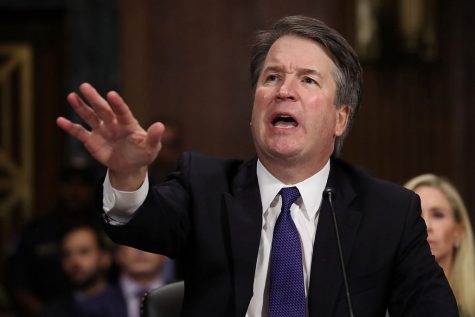 On July 9, 2018, President Donald Trump nominated Brett Kavanaugh, often described as a radical conservative, to take over for Anthony Kennedy as a Supreme Court Justice. On July 30, Dr. Christine Blasey Ford sent a letter to the top Democrat in the Senate explaining that Kavanaugh sexually assaultedher in high school. When the story came to light, Kavanaugh denied ever assaulting anyone.
On July 9, 2018, President Donald Trump nominated Brett Kavanaugh, often described as a radical conservative, to take over for Anthony Kennedy as a Supreme Court Justice. On July 30, Dr. Christine Blasey Ford sent a letter to the top Democrat in the Senate explaining that Kavanaugh sexually assaultedher in high school. When the story came to light, Kavanaugh denied ever assaulting anyone.
Kavanaugh and Ford both testified in front of the Senate Judiciary Committee, in which Kavanaugh was markedly angry, accusatory and firmly biased against Democrats. He was also accused by several members of the Senate of providing a false testimony and misleading answers.
For senior Mythili Ketavarapu, these facts alone prove that Kavanaugh should not have been sworn into the Supreme Court.
“[He] wasn’t treating the court with the respect that I think the establishment should deserve, especially if you’re going to be a Supreme Court Justice,” Ketavarapu said. “This isn’t even a matter of prosecuting him for the case, it was the matter of whether or not he should be deciding other people’s futures, and just to be on the safe side, the answer should have been no.”
On the other hand, senior Prabhat Jandhyala believes that there was nothing wrong with Kavanaugh’s confirmation.
“I might not like him as a person,” Jandhyala said. “[But] nothing was wrong with the way he was appointed. He wasn’t proven to [have commited] a crime; therefore, he should be appointed as a justice.”
Despite public uproar, Kavanaugh was sworn in as a SCJ, with a 50-48 vote. His confirmation secured a conservative majority on the Supreme Court and according to Ketavarapu, will undoubtedly affect some of modern day society’s most controversial topics, such as LGBT rights and abortion.
Natural Disasters
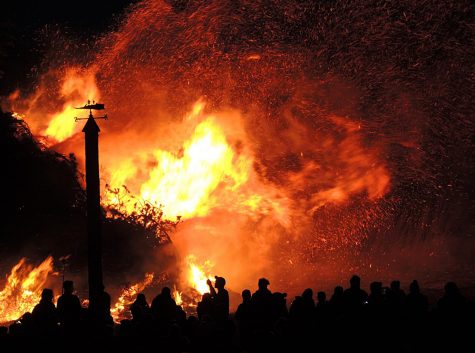 In the past year, the world has witnessed a wide variety of natural disasters, events that have affected millions of people across the globe. These disasters have ranged from Indonesia’s tsunamis to India’s floods to California’s wildfires. These catastrophes even took on rarer forms, such as Guatemala’s volcanic eruption and Pakistan’s heat waves.
In the past year, the world has witnessed a wide variety of natural disasters, events that have affected millions of people across the globe. These disasters have ranged from Indonesia’s tsunamis to India’s floods to California’s wildfires. These catastrophes even took on rarer forms, such as Guatemala’s volcanic eruption and Pakistan’s heat waves.
Regardless of the type of natural disaster, freshmen Rachel Wiley believes the effects are equally disheartening, especially because there is little anyone can do to stop the damage.
“People are dying and families are beingseparated, but I’m not entirely sure how we can prevent such hardships in the future,” Wiley said.
According to Wiley, the biggest thing people can do is try to mitigate the negative effects of these catastrophes and lend a helping hand, citing Empower Florida, a non-profit trying to raise money for Hurricane Michael disaster relief, as an example.
Many experts have attributed the increasing frequency and erraticism of natural disasters to climate change, a concept that many powerful people, including President Donald Trump, do not agree with. Wiley believes the first step towards any sort of change is acknowledging that climate change is a problem and raising awareness about the issue to your friends and family.
No matter the cause, freshman Aryaa Pathak believes that different people and places have dealt with the disasters in various ways, and the goal should be to react to these disasters in as much of a efficient and safe manner as possible.
“Of course these natural disasters can’t bestopped,” Pathak said. “But it’s how [the issues] are handled is what keeps our society safe or unsafe.”
Jamal Khashoggi
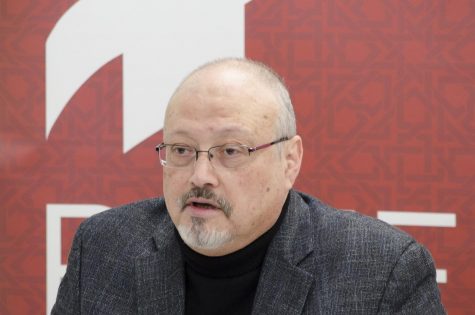
Another negative event from 2018 was the brutal assassination of Saudi Arabian journalist Jamal Khashoggi, a well-known critic of the Saudi government and monthly columnist for the Washington Post.
On Oct. 2., Khashoggi entered the Saudi consulate in Turkey, Istanbul to get a document needed to marry his fiancée. He never came out.
On Oct. 20, it was reported that Khashoggi died in the consulate after being apparently tortured, suffocated, mutilated, injected with a sleeping drug and dismembered with a bone saw. As the truth about Khashoggi’s murder came out, the general public reacted in outrage, demanding Saudi Arabia be punished. Senior Nitin Subramaniam echoes this sentiment.
“I would say that the fact that he is a journalist makes his death even more important to address,” Subramaniam says. “He’s there for reporting and providing news. Without journalists, we wouldn’t be able to understand what’s going on in all parts of the world.”
However, according to Subramaniam, the U.S., specifically President Trump, isn’t dealing with the issue appropriately.
“The way the U.S. handled the incident overall isn’t … showing any justice towards [Khasshogi] and his family,” Subramaniam said. “It kind of shows that [Trump]’s in it for the money. He doesn’t want to ruin relations with Saudi Arabia, which shouldn’t be the priority over the death of a journalist.”
While junior Aryan Kashyap agrees that Khasshogi’s death was a tragedy, he also sees the value in taking a less harsh approach to Saudi Arabia.
“There [was a lot of confusion] about whether his death [was] affiliated with Saudi [with Saudi Arabia] helps America economically significantly, and it’s a lot to throw away.”


